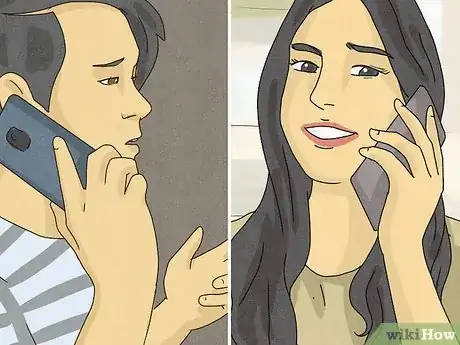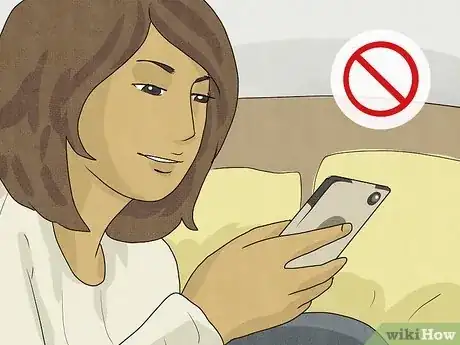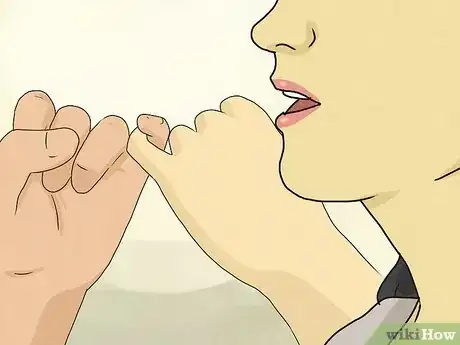This article was co-authored by Kelli Miller, LCSW, MSW and by wikiHow staff writer, Hannah Madden. Kelli Miller is a Psychotherapist based in Los Angeles, California. Kelli specializes in individual and couples therapy focusing on relationships, depression, anxiety, sexuality, communication, parenting, and more. Kelli also facilitates groups for those struggling with alcohol and drug addiction as well as anger management groups. She is the author of “Professor Kelli’s Guide to Finding a Husband” and the award-winning and best-selling book “Thriving with ADHD”. Kelli co-hosted an advice show on LA Talk Radio and is a relationship expert for The Examiner. She received her MSW (Masters of Social Work) from the University of Pennsylvania and a BA in Sociology/Health from the University of Florida.
There are 8 references cited in this article, which can be found at the bottom of the page.
wikiHow marks an article as reader-approved once it receives enough positive feedback. This article has 13 testimonials from our readers, earning it our reader-approved status.
This article has been viewed 1,076,575 times.
Most of us know that trust is a key element in developing a strong, long-lasting relationship. While it’s completely normal to have some doubts every now and then, not trusting your partner at all can lead to a lot of hurt feelings and relationship issues. That’s why we’ve compiled a comprehensive article so you can learn how to trust your boyfriend and strengthen your relationship overall.
Steps
Expert Q&A
Did you know you can get premium answers for this article?
Unlock premium answers by supporting wikiHow
-
QuestionWhy is it so difficult to trust my boyfriend?
 Kelli Miller, LCSW, MSWKelli Miller is a Psychotherapist based in Los Angeles, California. Kelli specializes in individual and couples therapy focusing on relationships, depression, anxiety, sexuality, communication, parenting, and more. Kelli also facilitates groups for those struggling with alcohol and drug addiction as well as anger management groups. She is the author of “Professor Kelli’s Guide to Finding a Husband” and the award-winning and best-selling book “Thriving with ADHD”. Kelli co-hosted an advice show on LA Talk Radio and is a relationship expert for The Examiner. She received her MSW (Masters of Social Work) from the University of Pennsylvania and a BA in Sociology/Health from the University of Florida.
Kelli Miller, LCSW, MSWKelli Miller is a Psychotherapist based in Los Angeles, California. Kelli specializes in individual and couples therapy focusing on relationships, depression, anxiety, sexuality, communication, parenting, and more. Kelli also facilitates groups for those struggling with alcohol and drug addiction as well as anger management groups. She is the author of “Professor Kelli’s Guide to Finding a Husband” and the award-winning and best-selling book “Thriving with ADHD”. Kelli co-hosted an advice show on LA Talk Radio and is a relationship expert for The Examiner. She received her MSW (Masters of Social Work) from the University of Pennsylvania and a BA in Sociology/Health from the University of Florida.
Psychotherapist It's possible that something from your past is informing your ability to trust now. If that's the case, being open about what you're feeling with your boyfriend and talking to a therapist will really help! However, if your boyfriend is doing something to trigger your suspicion, that's a different matter entirely and you should address that with him.
It's possible that something from your past is informing your ability to trust now. If that's the case, being open about what you're feeling with your boyfriend and talking to a therapist will really help! However, if your boyfriend is doing something to trigger your suspicion, that's a different matter entirely and you should address that with him. -
QuestionHow do you fix trust issues?
 Klare Heston, LCSWKlare Heston is a Licensed Independent Clinical Social Worker based in Cleveland, Ohio. With experience in academic counseling and clinical supervision, Klare received her Master of Social Work from the Virginia Commonwealth University in 1983. She also holds a 2-Year Post-Graduate Certificate from the Gestalt Institute of Cleveland, as well as certification in Family Therapy, Supervision, Mediation, and Trauma Recovery and Treatment (EMDR).
Klare Heston, LCSWKlare Heston is a Licensed Independent Clinical Social Worker based in Cleveland, Ohio. With experience in academic counseling and clinical supervision, Klare received her Master of Social Work from the Virginia Commonwealth University in 1983. She also holds a 2-Year Post-Graduate Certificate from the Gestalt Institute of Cleveland, as well as certification in Family Therapy, Supervision, Mediation, and Trauma Recovery and Treatment (EMDR).
Licensed Social Worker
-
QuestionWhat do you do when you can't trust your boyfriend?
 Klare Heston, LCSWKlare Heston is a Licensed Independent Clinical Social Worker based in Cleveland, Ohio. With experience in academic counseling and clinical supervision, Klare received her Master of Social Work from the Virginia Commonwealth University in 1983. She also holds a 2-Year Post-Graduate Certificate from the Gestalt Institute of Cleveland, as well as certification in Family Therapy, Supervision, Mediation, and Trauma Recovery and Treatment (EMDR).
Klare Heston, LCSWKlare Heston is a Licensed Independent Clinical Social Worker based in Cleveland, Ohio. With experience in academic counseling and clinical supervision, Klare received her Master of Social Work from the Virginia Commonwealth University in 1983. She also holds a 2-Year Post-Graduate Certificate from the Gestalt Institute of Cleveland, as well as certification in Family Therapy, Supervision, Mediation, and Trauma Recovery and Treatment (EMDR).
Licensed Social Worker This is a serious problem and can interfere with the ongoing relationship. It is important for the other person to acknowledge that they have violated your trust. Listen carefully to what they say and what they propose to win your trust back. Make sure your source is good if you accuse them of a violation.
This is a serious problem and can interfere with the ongoing relationship. It is important for the other person to acknowledge that they have violated your trust. Listen carefully to what they say and what they propose to win your trust back. Make sure your source is good if you accuse them of a violation.
References
- ↑ https://www.loveisrespect.org/resources/building-trust-after-cheating/
- ↑ https://www.loveisrespect.org/resources/trust-exercises-to-try-with-your-partner/
- ↑ https://www.psychologytoday.com/us/blog/friendship-20/201912/what-if-you-are-controlling-partner
- ↑ https://www.psychologytoday.com/us/blog/friendship-20/201912/what-if-you-are-controlling-partner
- ↑ https://www.ncbi.nlm.nih.gov/pmc/articles/PMC5380380/
- ↑ https://www.gottman.com/blog/4-tips-to-build-everyday-trust-in-relationships/
- ↑ https://www.psychologytoday.com/us/blog/friendship-20/201812/7-ways-build-trust-in-relationship
- ↑ https://www.gottman.com/blog/what-to-do-if-you-dont-trust-each-other/
- ↑ https://www.gottman.com/blog/what-to-do-if-you-dont-trust-each-other/
- ↑ https://extension.usu.edu/relationships/research/from-time-to-quality-time-making-every-moment-count
- ↑ https://www.ncbi.nlm.nih.gov/pmc/articles/PMC5380380/
- ↑ https://www.psychologytoday.com/us/blog/friendship-20/201812/7-ways-build-trust-in-relationship
- ↑ https://www.loveisrespect.org/resources/trust-exercises-to-try-with-your-partner/
About This Article
If you’re struggling to trust your boyfriend, think about the root cause of your mistrust. For example, if you were cheated on in a past relationship, try to understand that every relationship is different and your boyfriend doesn’t reflect your previous partners. Instead, spend more quality time together to strengthen your relationship, since too much distance can lead to anxiety and distrust. Another thing you can do is agree to admit your mistakes when you make them and apologize, so you don’t have to play guessing games. If you're worried about your partner talking about you behind your back, ask them to agree not to gossip about your relationship. For more tips from our Social Work co-author, including how to rebuild trust after a betrayal, read on!













































































Medical Disclaimer
The content of this article is not intended to be a substitute for professional medical advice, examination, diagnosis, or treatment. You should always contact your doctor or other qualified healthcare professional before starting, changing, or stopping any kind of health treatment.
Read More...